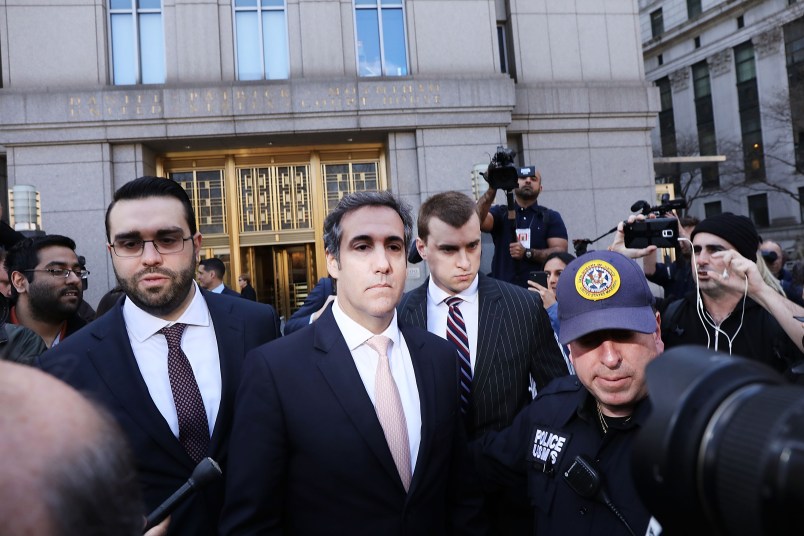NEW YORK — A federal judge on Thursday appointed a special master to review a trove of materials seized from Michael Cohen, to determine which are covered by attorney-client privilege.
Judge Kimba Wood named Bracewell partner Barbara Jones, a former mob prosecutor in the U.S. Attorney’s office and longtime U.S. District judge, to sort through material seized earlier this month from the office, hotel room, and apartment of Cohen, President Trump’s longtime fixer.
Jones’ work for both the government and in private practice lent her “all of the different points of view you would want to bring to these documents,” Wood said.
Though Jones was not on the suggested list of special masters offered by the parties involved in the case, no objection was made to her selection. Stephen Ryan, Cohen’s lead attorney, called her a “wonderful choice” to lead the review of materials seized as part of a wide-ranging federal grand jury investigation into Cohen’s personal and business dealings.
Joanna Hendon, the lead attorney representing Trump in the Cohen matter, said the situation represented a “compromise” for her client. She said Trump wanted to make initial privilege determinations about documents relating to him, but called the judge’s decision “acceptable.”
There was more of a conflict over what exactly Jones’ purview will be. Lawyers representing the Southern District of New York argued strenuously that it should be tightly limited to the privilege issue, and that Jones should not be empowered to determine evidence what evidence is irrelevant to the probe.
Both Jones and the Cohen team will be permitted to use keywords to sort through all of the seized documents to root out anything they consider privileged, the government agreed. But it was “very important,” assistant U.S. Attorney Tom McKay said repeatedly, that once that process was finished, a government “filter team” receive all of the materials deemed privileged “for the sole purpose of lodging any exception” to those designations.
If they don’t know what a particular privileged document says, McKay argued, they can’t decide whether or not it’s pertinent.
Wood said Cohen, like any criminal defendant, would likely feel uncomfortable having the government rifling through deeply personal documents like a child’s medical records.
After a brief volley, McKay insisted the government had no interest in doing so, but that the matter at hand was attorney-client privilege, not Cohen’s privacy. There was “no precedent,” he said, for a special master determining what personal materials that may have been seized could be relevant to their probe.
McKay suggested that “Cohen’s personal relationships” were in fact pertinent, and that he was concerned about “mission creep” and “slippage” if Jones or Cohen’s attorneys were to pull out specific documents that they deemed utterly unrelated to the investigation.
All parties ultimately agreed that privilege was the priority. If Jones or Cohen’s team happened in the course of their privilege review to come across a document that was, as Wood put it, completely “unresponsive,” they could set it aside, Wood said.
There were also vague hints of tension between lawyers for Cohen and Trump, who until now have been largely on the same page. After McKay made extensive comments about what materials the government should be able to review for objections, both Ryan and Hendon rushed to respond.
Hendon, already standing, began to speak, when Ryan stood and interrupted, saying, “I think it’s my turn.”
Hendon flushed and continued speaking until Ryan sat down, saying, “As the privilege holder, I appreciate your courtesy, Mr. Ryan.”
Also present at the hearing was Michael Avenatti, the lawyer for adult film star Stormy Daniels. Avenatti asked to intervene in the case on behalf of his client, who Cohen paid $130,000 just days before the 2016 presidential election to keep her from going public about allegations that she carried out an affair with Trump. After the government expressed concerns about the privilege review getting “sidetracked” by Avenatti’s involvement, Wood said she’d take a few days to review their arguments and make a formal decision.
The parties are next expected to reconvene at Manhattan’s DanielPatrick Moynihan courthouse for a status conference May 24.







Why the long, pale face, Mr. Cohen?
“Wood said Cohen, like any criminal defendant,”
That had to sting.
“On the recommendation of Senator Daniel Patrick Moynihan, Jones was nominated to the United States District Court for the Southern District of New York by President Bill Clinton on October 18, 1995”
Wiki
Kimba Wood: Trollmaster
Hmm I wonder if that could be because one of the principals blabbered his fat clown mouth on Fox and Executive Time Friends this morning and not only declared Cohen a liar, but completely undercut one of Cohen’s core claims in the case.
Maybe!
I’m really upset at the prospect of the special master (or worse yet, Cohen’s team) being allowed to make designations about “responsiveness”. As I believe the judge herself said, this isn’t a subpoena. If it’s not relevant to their case, and it’s not protected as privileged, why would it matter if the prosecutors saw it? All that exists here is the potential for evidence of other crimes to get buried as “nonresponsive”.